This blog post is full of links.
#littlebuddythis is my brick / there are many like it but this one is mine

Last week, I did a talk as part of Eyebeam's LittleNets
exhibition, on New York City's Governors
Island. It was a bit of a disjointed talk because
it's still a conversation whose edges I am
trying to feel out so what follows is something of a
revisiting of a revisitation, so to speak. This was
not an attempt to formulate a grand unified theory of
littlenets
but to poke at the phenomena and see
what poked back. There is, I believe, an audio recording of the talk
for anyone who might choose to fact check what I
really did and did not say at the time but as usual this is the story I want to remember.
When Ingrid Burrington first approached me to
participate in the LittleNets project I suggested,
given the timing of the event, that perhaps I would
try to revisit the talk I was still working
on for dConstruct. In many ways the questions raised by little
networks are the next step of the
argument advanced during that talk. I didn't get to
them when I was at dConstruct so rather than
reconsidering what I said in Brighton I'd like to pull
on this thread and see where it goes.
What both talks share though is an attempt to acknowlegde the very real, often very justified, sense of gloom and anxiety when we think about what the Network means in 2014 but to also indentify — and in some cases to remember — why it might still be important.
But first, some quotes and some unrelated stories to set the tone. The stories are like those people you haven't met but with whom you all share a common set of mutual friends. So while the stories themselves may seem disconnected I think that when you step back and look at them from a distance they often carry the same motivational velocity.

This is from the introduction to Simon Schama's
Citizens:
A Chronicle of the French Revolution
. He is
talking here about the choice to tell the story of the
Revolution in the form of a narrative rather than a
traditional historical survey.
It's a good book. You should read it. It's also a Very Big book but that just means it contains a whole lot of good book to read.
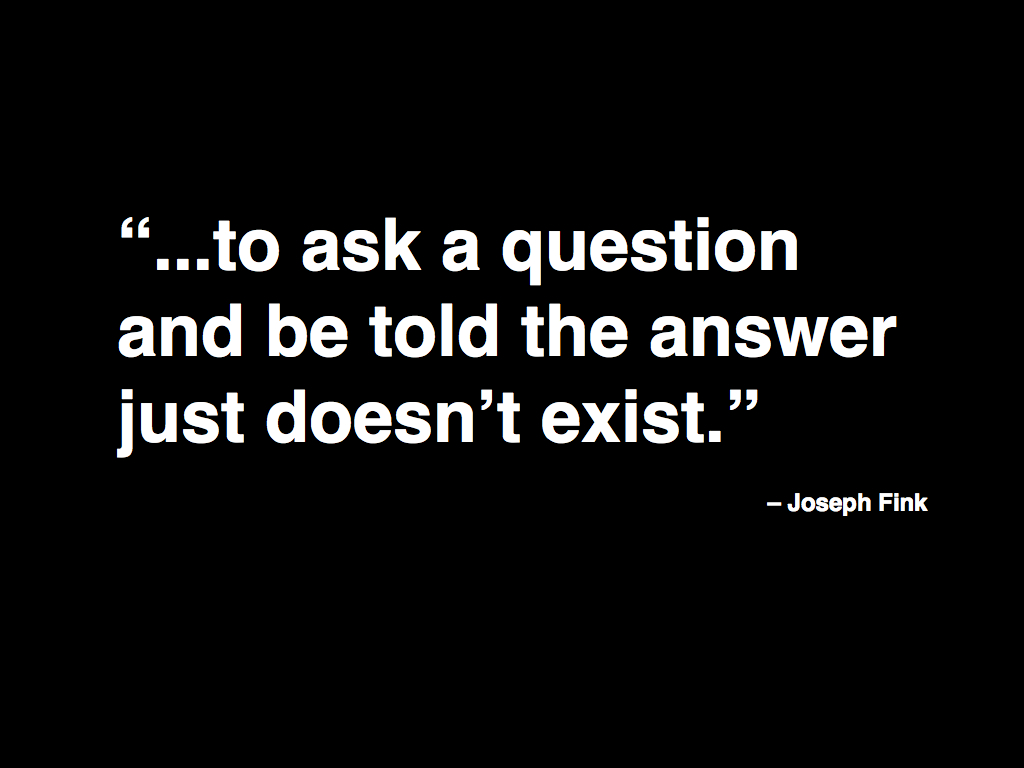
This is from Joseph Fink, one of the principals behind Welcome to Nightvale. The quote is from a talk he did at XOXO this year and he was talking about the sense of frustration that some of their audience feel when they are confronted with the creator's decision to actively resist filling in the archetypal details of the various characters. It turns out, this is not always something people are prepared to hear.

I guess you need to be a science fiction fan to enjoy the humour in this slide but it is pretty much my most favourite moment on Twitter ever.
Part of the reason these two quotes interest me is that I've been thinking a lot about origin stories and creation myths. I've been thinking about how we recognize and choose the imagery and narratives — the abstractions — that we use to re-tell a story. There's nothing a priori wrong with those choices. We have always privileged certain moments over others as vehicles for conveying the symbolism of an event.
It's part of the reason that I have been dwelling on the brick in the title slide for this talk. If you're not already familiar with it that brick is on display in the South tower of the 9/11 Memorial, formerly the World Trade Center, across the water in Lower Manhattan. It's a brick that was recovered from Osama bin Laden's compound in Abbottabad. Really.
Talking about 9/11 remains complicated especially so in New York City where many people still aren't ready to revisit the event or, more specifically, the imagery from the day itself. What was interesting in visiting the 9/11 Memorial, which is heavily trafficked by tourists and out-of-towners, is that I came away feeling like people who weren't here in person are now wanting, maybe even needing, to revisit that same imagery. Images that were replayed endlessly in the days following 9/11 and then all but banished from public view afterwards.
There are a pair of seven or eight foot tall
video loops
of the towers falling on display at the 9/11 Memorial
and the fact that visitors are taking selfies
standing in front of them might suggest that we
have finally plumbed the depths of craven
sensationalism. Or it could be that in those two short
sequences were captured the totality of an awareness
that a threshold had been crossed. That whatever the
story of 9/11 is in another seven hundred years
in the seconds — seconds — that
it took for the each tower to collapse in on itself
was the sight of all the oxygen being sucked out of the room and
replaced by the too many shades of bad craziness we've
known in years that followed.
Maybe that is why people are drawn to the video loops. Maybe that is why almost no one I've spoken to has heard of or, if they've visited the 9/11 Memorial, seen the brick from Osama bin Laden's compound. It's right there hiding in plain sight but not many people notice it. Nor have I met anyone who hasn't been genuinely touched by the reflecting pools, the two outdoor waterfalls titled Reflecting Absence, that occupy the footprints of the towers themselves. If the goal of the 9/11 Memorial is to convey to visitors the enormity and the scale of the impact of events that day perhaps that all that is needed are the reflecting pools and those two video loops?
It's a bit abstract, for sure, but so are all memorials. However, it is in the abstractions we choose that the foundational stories we tell ourselves and which serve as the fence-posts for the rest of our lives are found.

I've also been thinking about history as the space between the moments that come to define an event. History being the by-product of a sequence of events pulling apart from each, over time, leaving not just the peaks of a few dominant imagery but the many valleys of interpretation.
When I think of it this way I am always reminded of
Scott McCloud's Understanding
Comics in which he celebrates the magic in the
gutter
. The gutter being the space between frames where action is
unseen and left to imagination of the reader. These are the things I think of when I consider
something like the 9/11 Memorial and the construction
of a narrative around the event it commemorates.
Not much is left to abstraction and so it feels as
though the memorial itself acts as a vacuum against
interpretation, at all. It is a kind of
Interpretation Roomba
that moves through your
experience of the venue sucking up any space in which
you might be able to consider the event outside of the
master narrative.
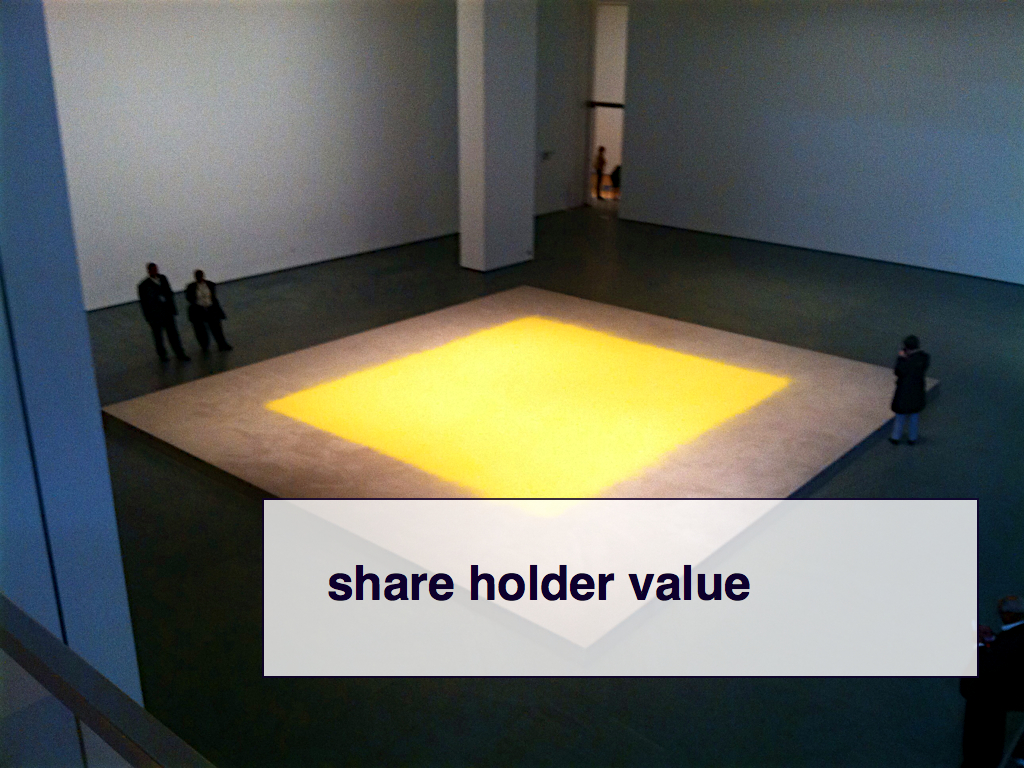
Perhaps the greatest narrative abstraction we've
ever known is the one we call shareholder
value
. I am fascinated by shareholder value
because it feels like the closest we've come to
taming motive. It is in fact the pure white-hot
light of motive itself. There is no doubt in shareholder value and with that
comes the affordance of confidence. The confidence to
take motive for granted which opens up some pretty
fertile terroitory it turns out. To argue that there
is no doubt in shareholder value is not to
argue that is absent of consequence.
The absence of any mitigating concerns in a shareholder value driven corporation has, we've discovered, loosed particularly deviant forms of behaviour that we aren't entirely sure how to rein in anymore. The elegance of shareholder value, for me, is not in the results but simply the ability by which it has been able to wrestle a community of heterogeneous actors in a single direction which, after all, has been the burden and struggle of any body politic for as long as we've had communities and societies.
I work at a
design museum and one of the things that I would
like for us to acquire as a design object is the Benefit
Corporation, often known more simply as the
B-Corp
. I'm still not sure what this means for a museum to collect, if
we're getting down to brass tacks, but I am interested
in the B-Corp precisely because of how it relates to
that other designed object, shareholder value.
The B-Corp is still a for-profit entity with
shareholder and fiduciary responsibilities but with
the added purpose or responsibility of ensuring
transparency and accountability in their workings and
of acheiving a material positive impact
on
society and the environment. These are not burdens
placed on a company by the state or the community but
undertaken by an enterprise itself. And yet it is
still a for-profit (a shareholder value driven) corporation.
It is a particularly deft way of re-wiring the by-laws of an enterprise such that it torks that perfect crystalization of motive inherent in shareholder value just enough to reintroduce measures of ambiguity — society and the environment, anyone? — in to how decisions are made and disputes are resolved.

A couple of years ago, in what may have been the opening thunderclap in a series of long, dark and stormy nights of 1990's nostalgia, the New Museum staged an exhibition titled NYC 1993: Experimental Jet Set, Trash and No Star. As part of the exhibition they hosted a lecture and panel titled The Internet Before the Web: Preserving Early Networked Cultures which was largely about the technologies and the communities that cut their teeth around bulletin board systems, or simply BBSes.
One of the panelists was an artist named Wolgang
Staehle who founded The
Thing BBS, in 1991. The Thing was notable for not
simply being one of the first artist-run BBS' in New
York City but also because it had multiple nodes, in a
handful of European cities, and every night all of the
messages would be synced between systems. One of the things he said that
night, which seems sort of self-evident in hindsight
but which struck a nerve with me at the time was, and
I am paraphrasing:
You know, before any of this all we had to
communicate with each other was the postal service and
the corresponding one to two week lag built in to
every conversation. Now instead of two weeks it was
one day and now instead of one individual forwarding
something on to the next individual we could all read
something and comment on it, by the standards of what
existed before, at the same time.
After the panel some of us went out for drinks and for people of a certain age it was difficult not to fall prey to moments sounding exactly like our parents and saying things like: The kids today, they don't know what it was like back in the day when all we had were bulletin board systems...
I mention this for a couple reasons.
The first is to ask the question: Is a slow network akin to no network at all? It is hard to imagine going back to the dial-up speeds of the 1990's Internet and I expect it would be a shock to someone who's never experienced them but I think we would all do well to keep Staehle's comments about the time to broadcast and the time to relay in mind.
The second is that as we were all sitting around
the table waxing nostalgic about 28.8 Kbps modems I
remember thinking: Actually, when I first discovered
the web I wanted the next generation to be
able to take this for granted. I wanted the
kids
to live in a world where the Internet was
just part of the fabric of life, where it didn't need
to be a philosophical moment everytime you got online.
The good news is that this has, by and large, happened. The bad news is we've forgotten why it was important in the first place and if it feels like the Network is governed by — and increasingly defined by — a kind of grim meathook fatalism I think maybe that's why.
Somewhere in all the excitement of the last 20 years we forgot, or at least neglected, the creation myth and the foundational story behind the Network and in doing so we have left open a kind of narrative vacuum. We have left the space — the opportunity — to say why the Network exists at all to those who would see it shaped in ways that are perhaps at odds with the very reasons that made it special in the first place.
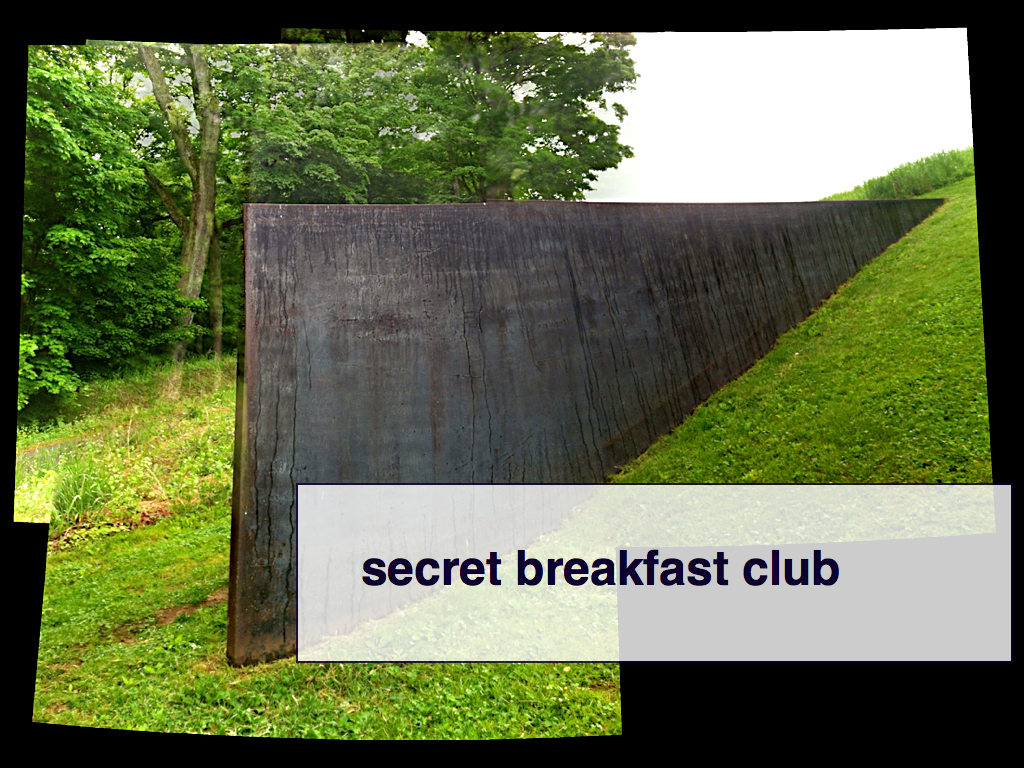
With that in mind I would like to suggest that littlenets
have
always been relative. Consider:
- Royal courts.
- The so-called Republic of Letters, the community of 17th and 18th century intellectuals who communicated through that most primitive of sneakernets called hand-written letters.
- Cafe societies and salons.
- New York City — because remember, before the Internet New York was genuinely the center of the Universe. You no longer have to be in Manhattan (or even Brooklyn) anymore to find the debate or just like-minded peoples and that is a reality the city has been struggling to deal with ever since.
- Bulletin board systems, newsgroups, the recent resurgence of mailing lists.
So I think one of the questions we would do well to
ask ourselves is: Is the idea of the littlenet
simply coded language for a kind of secret breakfast club which
in turn only exists relative to the exclusion of the
biggernet? The issue here not being so much any particular
network but rather the social and cultural forces that
they are subject to and often warped by. Which raises another question: If littlenets
have always acted as a kind of desire-trap, distinct
from whatever their fundamental is-ness is, does our
interest in them now point to a deeper concern?

Littlenets are not one single thing but tend to be associated with a particular class of projects: Community wireless and by extension mesh networks. Community wireless projects inspire the same question in me everytime: Why are they always portal pages? I mean really, why? If the chat features built in to the seatback-entertainment systems on airplanes were ever used then I might be able to make sense of it but since they're not I continue to fail to understand why we build these genuinely well-meaning projects in the service of a community along the same lines.
I knew some of the people involved in Île Sans Fil (ISF) an early community-based project to provide wireless access points in Montreal. ISF was and remains awesome and I continue to support the idea of using the notional common space — the neighbourhood or the coffee shop itself or at least the captive portal login page everyone had to sign in through — to share local news and promote local events. But I never once used it and I don't know anyone who ever has.
I certainly never used it to introduce myself to someone else who was sitting on the other side of the room. Maybe some people did it always felt a bit proscriptive to think I would do something in a public space where I had never done it before just because some of us happened to be online. I love that the Network gave cause for people who might otherwise have never met to come together every month for 10 years but we did it at our own pace.
But it's a bit weird when getting online becomes an activity which becomes an obligation which becomes a ritual. I am pretty sure the reason the Network was so exciting in the first place was that it was none of these things.
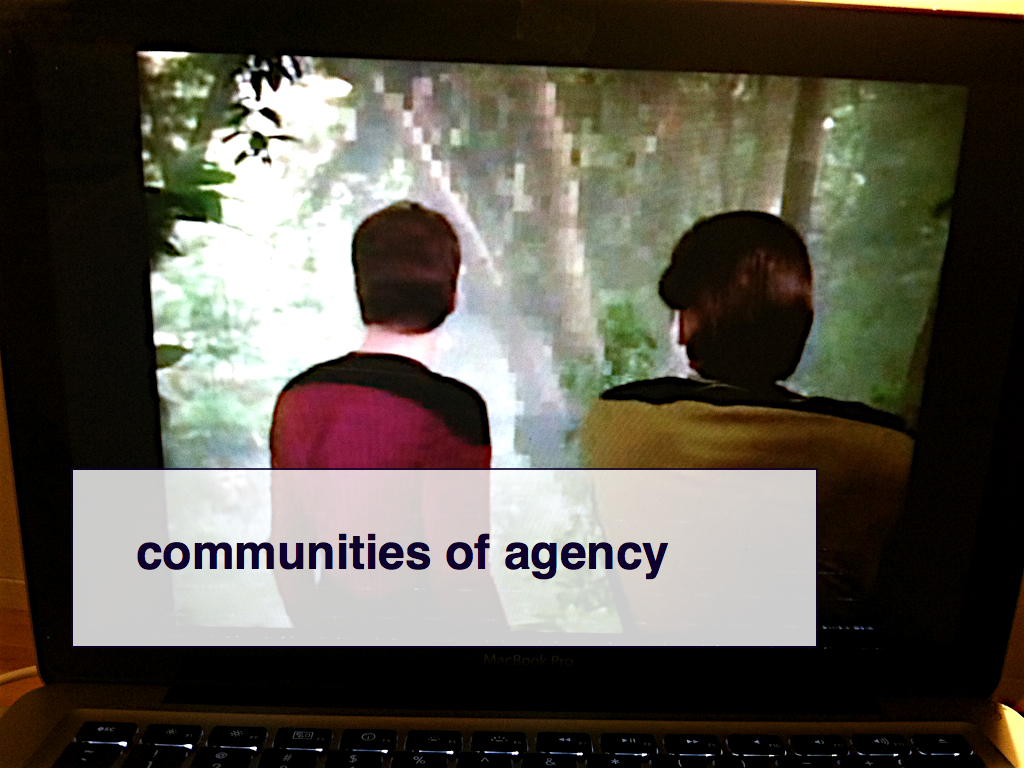
For those of you not
versed in Star Trek history this is a still from the
first episode to feature the holodeck
. In this scene Data and Riker
stand at the
pixelated edge of the world
having just discovered that the New
Aesthetic lies on the other side.
Another question I've been asking myself as I've been thinking about this talk is: Does a littlenet simply transit data or does it terminate that same data? Is a littlenet specific to a place? Are littlenets defined by the effort is takes to get there? That seems a bit weird and almost antithetical to the idea of the Network, right?
Maybe not though or maybe it's less about littlenets acting like destinations or encouraging a particular set of rituals but instead simply taking advantage of the properties the Network offers to provide bespoke services. For example, what if bars ran captive portal networks that you couldn't get out of, like Dan Phiffer's Occupy.here, but all they did was offer access to a dictionary?
...it's just not notationally anywhere near so convenient. I mean, it's sort of loosely analogous to working with Roman numerals instead of Arabic numerals. It's not that you can't do arithmetic, it's just a bitch. Much more difficult, perhaps, and therefore mentally...more constraining.
I did not include this quote by Brian Kernighan in the original talk. If I had I might have put it just before Joseph Fink's quote. This feels like a nice place to put it for posterity.
That might seem like an absurb example at first but let it sink in for a minute or two and if you're like me you'll find yourself thinking that would be kind of awesome. A dictionary in a bar is a polite of saying We're here to foster the conversation on your own terms rather than dictate it on ours.
A dictionary in a bar would be a service
in
the... well, in the service of the thing that bars don't need any
help with: conversation, socializing, play. People aren't going to
stop frequenting bars that they don't have
dictionaries in them, but a bar with a dictionary in
it would be that much better.
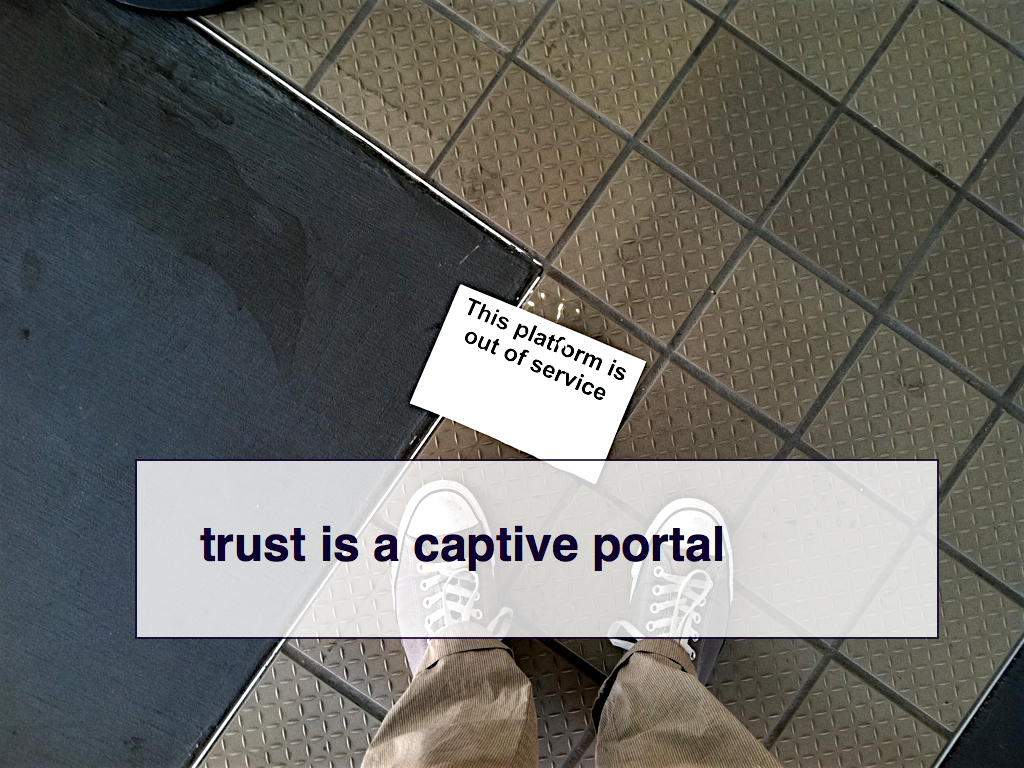
If a littlenet does not terminate then does it or should it engage in traffic shaping? What separates a littlenet from a fake cell phone tower? What about deep packet inspection (DPI) ? What about goatse? If a littlenet does not drink the common carrier Kool-Aid is it still a Network or just gated-community for like minded participants?
None of these problems go away just because a network is little and it is their little-ness and their potential ubiquity that exascerbates these problems. It casts the questions around an infrastructure of trust as much as an infrastructure of reach in to relief.
We have historically relied on the scarcity and the difficulty of access to the tools that can manipulate the Network at... the network layer as a way to manage those questions of trust. Ultimately, littlenets force those larger issues of how we organize (and by definition how we limit) ourselves as a community to the fore. It speaks to the question of public institutions and their mandates. It speaks to the question of philosophy trumping engineering.
It speaks to the question of how we articulate an idea of the Network and why we believe it is important and what we do to preserve those qualities.

Imagine if we all went home after this talk to discover that NSA had, as a public service, started doing DPI and filtering to block Shellshock attacks at the network layer? That they were doing this in the name of public safety. Given the potential severity of the bug and its consequences it's difficult to reject the proposition out of hand. That would be an awkward moment for a lot of people because that is the very same technology we've been worried will be used as a means of control and coercion.
Because this isn't about the technology, per se, but the intellectual and social models in which those tools are deployed. The Fourth Amendment of the US Constitution doesn't try to solve for deviant behaviour on the part of the authorities but rather re-frames or safeguards the question as one of admissibility. Something may in fact — like real-life-fact — have happened but if the collection of that proof violates the rights enjoyed under the Fourth Amendment then it doesn't count.
That doesn't mean it's always clear-cut. At the moment there are at least two Fourth Amendment decisions that would appear to be at odds with one another. In US v. Jones the Supreme Court ruled that the police could not simply place a GPS-tracking device on a person's car and follow them around. On the other the various circuit courts can't seem to decide whether historical cell-tower location data should enjoy the same protections. Personally I don't really see how you can argue the former and not the latter. More importantly though is that in both cases the issue is the merit and the persuasiveness of the argument and the fact that we argue about it all rather than simply submitting to a technological inevitability.
Which isn't to say that a certain amount of technological inevitability isn't a real thing. We have a hard enough time managing, containing and adjusting the impact and opportunities of new technologies inside the hula-hoop of a single society. It is often harder to defend the social contracts we forge for ourselves from ourselves than from outsiders, real or perceived. In a networked world suddenly that same dynamic can be played out with everyone, where everyone means every conflict ever recorded from tribes to nation states, and without the comforting illusion of a geographic burden borne by others, to protect us.
For a properly depressing time everyone should read the work of Dan Geer. His writing is especially depressing because he makes some pretty cogent arguments in the service of equally sour conclusions: That the Internet is fundamentally incompatible with critical infrastructure and that at the end of the day cybersecurity is akin to Realpolitik. I've included the links to a pair of especially relevant essays below. I mention them here because it's a discussion that you should be aware of if you're thinking about littlenets and because it advances an unnervingly just-that-side-of-possible narrative for a particularly awful kind of Network Darwinianism.
Let's play pretend for a moment and consider the actions of a company like Google these last few years in that light. Google is laying its own fiber network (like going out in the world and digging trenches and stuff) at the same time it is taking to the skies (with drones and balloons and even satellites) at the same time it is buying all the robotics companies most notably Boston Dynamics, whose superpower seems to be an ability to mine the creepiest regions of the robotic uncanny valley.
It would be easy to joke that Google bought Boston Dynamics so they can send BIGDOG units to to defend their underwater cables from sharks but if you replace sharks with a competitor or even a nation-state then, taken as a whole, Geer's tracing of Realpolitik-shaped shadows behind everyone's actions start to seem hauntingly plausible.
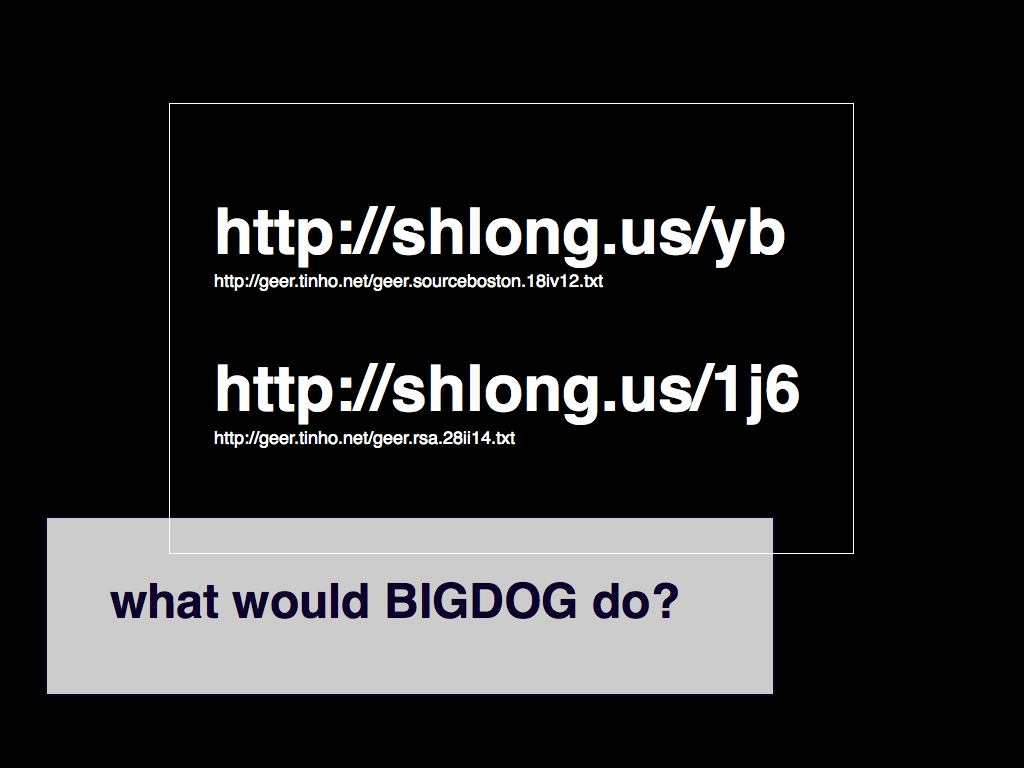
Here are the links to the two essays by Dan Geer I mentioned:
Sad face.

But in the end we also decided that Realpolitik was a bit shit.
About all it got us was the First World War and we are still picking up the pieces from that mess. Here is another fiction we might entertain. It is not fully formed and lacking enough details that I could justifiably be accused of suffering from why-can't-we-be-nice-to-each-other-ism but think of this more as an attempt to give the conversation a narrative arc rather than a proposal for a concrete solution.
It goes like this: If we liken the network to weather what does it mean to think of its climate as too hostile for any one person to survive in isolation? What would that mean, really? I have no idea and I recognize that this is one line of argument in support of a benevolent all-seeing surveillance state but perhaps there are parallels to be found in the way that cold-weather countries organize themselves relative to the reality of winter. Regardless of your political stripes in those countries there is common cause in not letting people face those months alone to die of exposure.
I really don't know how or whether this translates to the Network in part because it's not clear to me whether the problem is not having access to the Network, not having unfettered access to the Network (think of those Facebook-subsidized and Facebook-only data plans for mobile phones) or that the Network itself, left unchecked, is in fact a pit of vipers.
Should the state suspend reality in the service of a mandate for the Network the way that they sometimes do for universal health care or, if you live in the US, the highway system? Is that just what we now call network neutrality or should we do more to temper the consequences of assuming the Network is inherently hostile? To activiely foster more communitarian sensibilities and safeguards?
You're not supposed to say this out loud,
particularly in light of events like the
Snowden revelations, but
the reality is societies announce that 2+2=5 because reasons
all the
time.
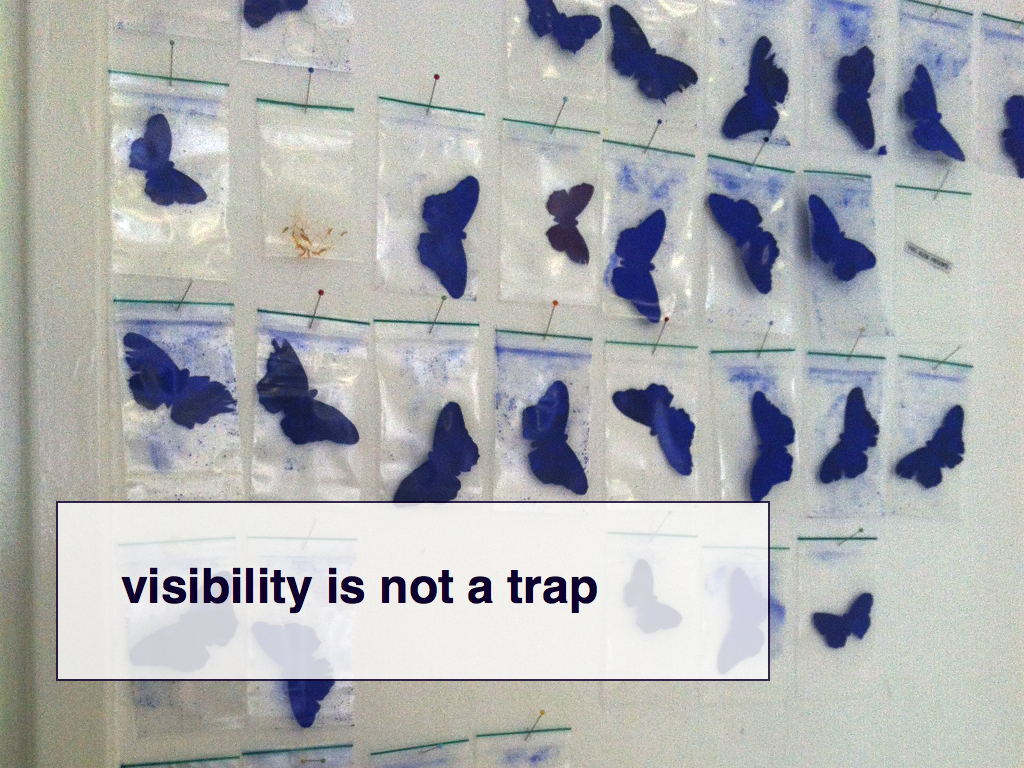
The day I arrived in Brighton for dConstruct, the
Improving Reality conference was being held. The theme
this year was Visibility
is a Trap. I was unable to attend because I needed
to finish preparing for my talk before jetlag got the
better of me. By all accounts the event was excellent
and I regret not being able to attend because the idea
that visibility is a trap
makes me bristle.
It's not that I don't understand why someone might say that, these days. Nor would I advocate for the kind of radical transparency that some people do, although there's a discussion to be had about where that idea stops being bad for institutions and starts to be detrimental for individuals because I think we often play fast and loose with those distinctions.
My issue is that we have spent a good deal of the last 500 years (give or take) trying to make visibility a legitimate concern. We have spent a lot of time and lot of effort arguing that there is a space for voices outside the dominant culture and to now choose to retreat in to invisibility, as a tactic, seems counter-productive at best and fitting the needs of people who were never really down the project at worst.
The only reason many of know each other is because
we were willing, because we desired, to stick our head
above the parapet of the Network and say I am here
. Acting in public remains complicated
and is still decidedly
unfair for many but if the creation myth of visibility is one of
malice-by-default then we might have a bigger problem on our hands.

During the Cold War people in Soviet-controlled
countries used to read and
distribute banned publications as so-called
samizdat
. This is what Wikipedia has to say about samizdat:
Samizdat distinguishes itself not only by the ideas and debates which it helped spread to a wider audience, but also by its physical form. The hand-typed, often blurry and wrinkled pages which possessed numerous typos and nondescript covers helped to separate and elevate Russian samizdat from Western literature. Though the physical form of samizdat grew out of the simple lack of resources and necessity of inconspicuousness, dissidents in the USSR began to fetishize samizdat for the sharp contrast between samizdat’s ragged appearance and the appearance of texts published by the state. The form of samizdat itself took precedence over the ideas expressed in it, and came to symbolize the resourcefulness and rebellious spirit of citizens of the Soviet Union. In effect, the physical form of samizdat itself elevated the reading of samizdat to a prized clandestine act
The question everyone is being forced to ask themselves these days is: What if the well has been poisoned?
Maybe not all the evidence but quite a lot of it would suggest that the Network is either suffering a tragedy of the Commons or that it's been co-opted by some kind of freakish Broadcast Nation Counter-Reformation or simply mob rule.
The reality is always more nuanced but let's use my hyperbole to imagine a worst case scenario — try to imagine the Internet going dark unannounced tomorrow — so that we might imagine what we do. Or rather why its absence would prompt us to do anything at all.
The reason I quoted the Wikipedia entry
on samizdat at length is because I think it's just as
easy to fetishize the littlenet for its form and its
counter-narrative at the expense of what it actually
makes possible. To that end I have come to think of the idea of the
littlenet
as more of a conceptual device with
which to think about a Network held hostage to
Realpolitik.

The problem I have with littlenets is that I
want to live in a world with a
biggernet
that doesn't make me sad or suspect
or hate everyone around me. The concern I have with
littlenets is that they offer a rhetorical bluff from
which to avoid the larger social questions that a
networked world lay bare. And that in avoiding those
questions we orphan the reasons (the creation myths)
why the Network seemed novel and important in the first place.
There's a meme which has been bubbling up more and more often these days, advanced by people like Ingrid and others, that perhaps libraries should operate as internet service providers. That the mandate of a publicly-minded institution like a library is best suited to a particular articulation of the Network as a general-purpose possibility space.
Libraries lend books on the principle that access to information is value in and of itself not because they know what people will do with that knowledge. Libraries have also been some of the earliest adopters of littlenets in the service of that same principle in the form of electronic distribution hubs. I bet some of those littlenets even have dictionaries on them.
Update: Raffaele Messuti's blog post a wayback machine (pywb) on a cheap, shared host is a really nice example of this idea.
So, despite my reservations and in the interests of defaulting to action maybe we should all endeavour to run our own read-only littlenets of stuff we think is worth preserving and sharing. If the politics and the motives surrounding the Network are going to get all pear-shaped in the years to come then maybe littlenets are our own samizdat and the means to save what came before and to say as much to ourselves as to others: This is how it should be.

This blog post is full of links.
#brick